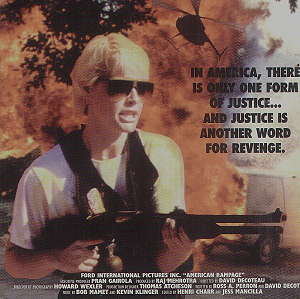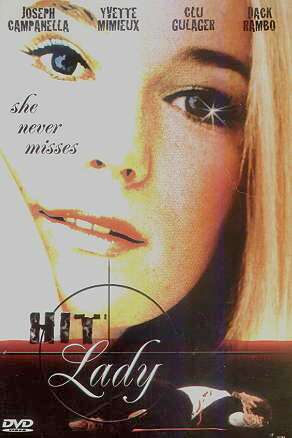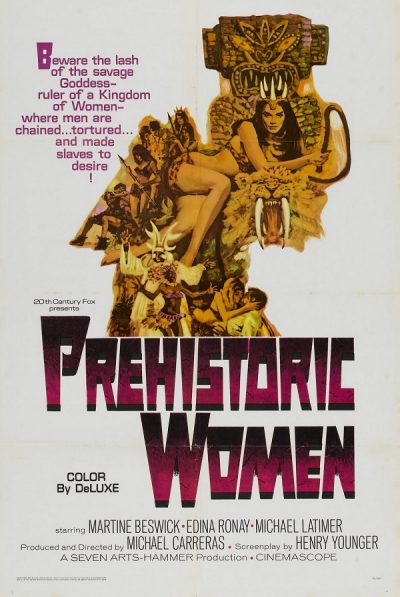★★★
“The beauty is a beast, in lurid yet chaste 1960’s European comic adaptation.”
 Originally, Satanik was the villain in a series of Italian photonovels/comics. But in 1964, writer Max Bunker changed the sex and this 1968 movie – set in Spain, made by Italians – followed, though Satanik isn’t mentioned by name (I guess, a little like Heavy Metal). The central character here is a disfigured scientist, temporarily turned beautiful by a potion which also removes all her morals and inhibitions. The body count mounts, and to escape the cops, she takes another woman’s identity; unfortunately, her victim was a police stoolpigeon, and those she grassed up are also very keen to find her. Plus, her medication is wearing off…
Originally, Satanik was the villain in a series of Italian photonovels/comics. But in 1964, writer Max Bunker changed the sex and this 1968 movie – set in Spain, made by Italians – followed, though Satanik isn’t mentioned by name (I guess, a little like Heavy Metal). The central character here is a disfigured scientist, temporarily turned beautiful by a potion which also removes all her morals and inhibitions. The body count mounts, and to escape the cops, she takes another woman’s identity; unfortunately, her victim was a police stoolpigeon, and those she grassed up are also very keen to find her. Plus, her medication is wearing off…
The comics had a broad range of supernatural themes, featuring vampires, etc. but the only extra-real element in the film is the potion. What delights here, is a villainess totally lacking in scruples, reliant only on herself, making the film years ahead of its time in this aspect. Less appealing are some truly horrible fashions, proving the 60’s match the 70’s for wardrobe atrocities.
Still, the soundtrack grooves, and some thought went into this, even if the ending leaves much to be desired, almost as if it was tacked on to appease the censors. Konopka was obviously cast for looks, as her (kinda tame) stripteases prove – in one, a homage to another comic-book character, Diabolik, the last item removed is a balaclava – yet doesn’t disgrace herself. Neither does anyone else, save perhaps the costume designer, though you won’t mistake this for less than 30 years old.
Spooky coincidence time: we finished watching it about 11pm, and went to sleep. Woke up next morning, turned the TV on…and the first thing we saw? Konopka’s only other film of note: When Dinosaurs Ruled the Earth. Does this mean anything? No, not at all. But it was kinda cool. :-)
Dir: Piero Vivarelli
Star: Magda Konopka, Julio Pain, Umberto Raho, Luigi Montini






 While not averse to the idea of gratuitous nudity in movies, this movie presents some of the most startlingly unattractive examples I’ve seen in some time – but then, director Decoteau is now making (more or less openly) gay-interest movies, so his judgement in such things is highly suspect. Even the heroine, Detective Samantha York, is…well, let’s be kind and say “homely”, though this could count as refreshing realism, given LAPD officers don’t win many beauty contests. I would like to think, however, that they are better shots; York couldn’t hit a barn if she was standing inside it.
While not averse to the idea of gratuitous nudity in movies, this movie presents some of the most startlingly unattractive examples I’ve seen in some time – but then, director Decoteau is now making (more or less openly) gay-interest movies, so his judgement in such things is highly suspect. Even the heroine, Detective Samantha York, is…well, let’s be kind and say “homely”, though this could count as refreshing realism, given LAPD officers don’t win many beauty contests. I would like to think, however, that they are better shots; York couldn’t hit a barn if she was standing inside it. Things the movies teach us, #285: if you are a criminal, do not agree to do “one last job” before retiring, because it never works out that way. I guess assassin for hire Mimieux doesn’t go to the cinema enough, or she’d have known this, rather than letting herself get talked into that OLJ, in this case, killing a union leader. To make it look like an accident, she has to get close to him, only to find herself falling in love with her target – a common hazard of the job, going by how often this happens in films. From here, it’s all downhill, as her identity is compromised, and she has to flee.
Things the movies teach us, #285: if you are a criminal, do not agree to do “one last job” before retiring, because it never works out that way. I guess assassin for hire Mimieux doesn’t go to the cinema enough, or she’d have known this, rather than letting herself get talked into that OLJ, in this case, killing a union leader. To make it look like an accident, she has to get close to him, only to find herself falling in love with her target – a common hazard of the job, going by how often this happens in films. From here, it’s all downhill, as her identity is compromised, and she has to flee. Don’t believe the running time: listed at 83 minutes on the DVD sleeve, this is actually under 50, a nasty piece of marketing to make you think you’re getting a full-length movie. Not sure whether an extra 25 minutes would help or harm here: there is certainly room for development, but equally, there is an awful lot of slack which seems designed only to show off whizzy digital animation. Saya is a vampire. She’s also a killer, tasked by…well, it’s never quite made clear
Don’t believe the running time: listed at 83 minutes on the DVD sleeve, this is actually under 50, a nasty piece of marketing to make you think you’re getting a full-length movie. Not sure whether an extra 25 minutes would help or harm here: there is certainly room for development, but equally, there is an awful lot of slack which seems designed only to show off whizzy digital animation. Saya is a vampire. She’s also a killer, tasked by…well, it’s never quite made clear 
 This sprang virtually fully-formed from the twisted mind of McCracken back in 1992, as a student film: even then, he intended it as a series, with most the characters, both heroines and villains, already present. The main change was to the title, the Cartoon Network balking at presenting a show called The Whoop-Ass Girls, and so the “can of whoop-ass” which was originally part of their make-up, was replaced by Chemical X.
This sprang virtually fully-formed from the twisted mind of McCracken back in 1992, as a student film: even then, he intended it as a series, with most the characters, both heroines and villains, already present. The main change was to the title, the Cartoon Network balking at presenting a show called The Whoop-Ass Girls, and so the “can of whoop-ass” which was originally part of their make-up, was replaced by Chemical X. Hammer were best known for their horror movies, but tried virtually every genre save Westerns at one time or another. This Roman “epic” is loosely based on the life of Boadicea, who led a revolt against the Romans in the first century A.D. They get the name of her tribe right (the Iceni), and some basic facts, such as her suicide after capture, but change her name to Salina and sprinkle in some wild inaccuracies. Despite the title, there are no actual Vikings to be found, and we also get the Druids worshipping Zeus, a Greek god!
Hammer were best known for their horror movies, but tried virtually every genre save Westerns at one time or another. This Roman “epic” is loosely based on the life of Boadicea, who led a revolt against the Romans in the first century A.D. They get the name of her tribe right (the Iceni), and some basic facts, such as her suicide after capture, but change her name to Salina and sprinkle in some wild inaccuracies. Despite the title, there are no actual Vikings to be found, and we also get the Druids worshipping Zeus, a Greek god!

 Another slightly clunky Korean title (see also Guns & Talks), but the first forty minutes or so of this are about the driest comedy/action you could ever hope to see. In order to fulfill the wish of her terminally-ill sister, mob boss Eu-jin (Shin), or “Mantis” as she is known, decides she to get married. Of course, she needs an especially stupid husband who won’t realise her true occupation, and finds one in Soo-il (Park), a civil servant with a 0% success rate on his blind dates. Their courtship, pre-nuptials and wedding (the last interrupted by a rival gang – a “martial arts demonstration”, as a fast-thinking sidekick calls it) are executed perfectly, largely thanks to Shin and her expressions of shock and horror at the mating game.
Another slightly clunky Korean title (see also Guns & Talks), but the first forty minutes or so of this are about the driest comedy/action you could ever hope to see. In order to fulfill the wish of her terminally-ill sister, mob boss Eu-jin (Shin), or “Mantis” as she is known, decides she to get married. Of course, she needs an especially stupid husband who won’t realise her true occupation, and finds one in Soo-il (Park), a civil servant with a 0% success rate on his blind dates. Their courtship, pre-nuptials and wedding (the last interrupted by a rival gang – a “martial arts demonstration”, as a fast-thinking sidekick calls it) are executed perfectly, largely thanks to Shin and her expressions of shock and horror at the mating game.